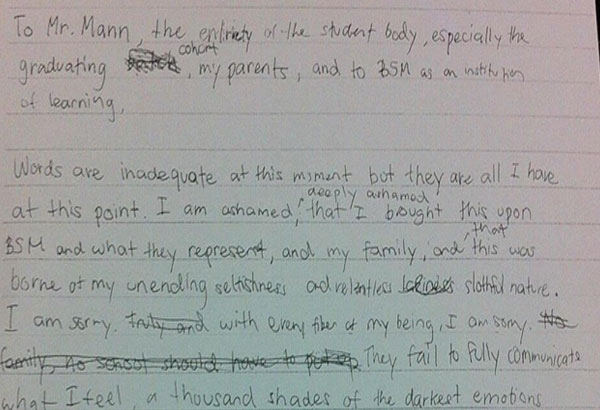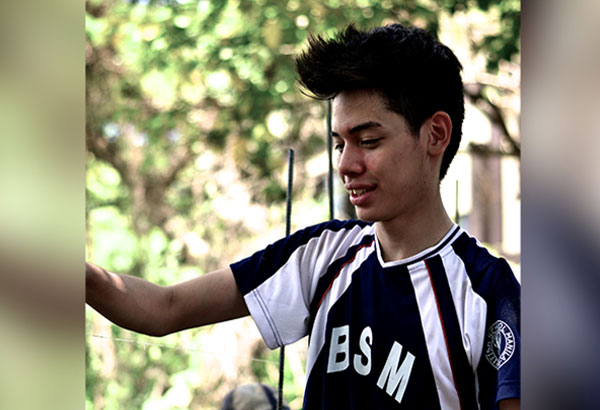Suicide and the need for a mental health law

© Trixie Madamba
I recently interviewed Anara Chiongbian, a young intern in my office who just graduated from the British School of Manila (BSM). As it happens, she was also a classmate and good friend of Liam Madamba, the 18-year-old who had jumped off a car park building in Makati after having been censured at school for alleged plagiarism a day before the incident.
Anara shared her thoughts about Liam and his tragic ending.
“He had a sheepish charm about him. People respected him because of his friendly disposition and wonderful eloquence in writing.”
He knew what he wanted and worked hard to get it. “Apart from family and friends, nothing meant more to Liam than his scholarship and succeeding to gain a better future. He would often talk about studying creative writing and comparative literature in college, before settling down to become a writer-poet.” she added, “Everyone felt he would succeed.”
Liam’s mom, Trixie Madamba, remembers her son as an even-tempered and gentle person, “(His was a) cheeky sense of humor. He had simple joys, like a good book or movie, 1950s music, and playing ‘Dungeons and Dragons’ or ‘The Call of Cthulu’ with his closest friends.”
Liam often said:“Introversion is not always viewed as a positive thing; one is often viewed as being timid or shy, with an absence of substantive things to say. But in a society where people tend to talk rather than listen, heeding the words of others allows your own opinion to be developed and become more sophisticated.”
That is why everyone—even those closest to him—was so surprised when he took his own life.
Liam died in February, four months short of finishing high school.
The stigma against suicide victims—as well as survivors—reveals profound cultural biases. Derogatory terms like “disturbed,” “depressed” or “unpredictable” get fortuitously applied to victims and survivors alike. Worse, victims and their families face an atmosphere of spurious attacks on mental health made by both the public and religious groups.
Equally unfortunate is widespread apathy. Many easily dismiss suicidal victims, concluding that their decision to escape the chaos of life ultimately stems from cowardice and an inability to bear the normal vicissitudes of daily living.
For Liam, the pain likely stemmed from being forced to write a shame-bearing letter—addressed to the graduating cohort, his family, and the entire school community—as demanded by his teacher, Natalie Mann. This may have been compounded by the threat of losing his scholarship and not being able to graduate. “I am sorry. With every fiber of my being, I am sorry,” Liam confided in the letter.

(LETTER OF APOLOGY: “To Mr. Mann, the entirety of the student body, especially the graduating cohort, my parents, and to BSM as an institution of learning, Words are inadequate at this moment but they are all I have at this point. I am ashamed, deeply ashamed, that I brought this upon BSM and what they represent, and my family, and that this was borne of my unending selfishness and relentless slothful nature. I am sorry. With every fiber of my being, I am sorry." © Trixie Madamba)
Liam’s suicide drew public attention, including from the Philippine Senate. What drew even more attention was the alleged mishandling by the teacher-in-charge, Natalie Mann—who was accused of bullying him by many parents, including Liam’s own.
In recent hearings, Senator Sergio Osmeña cautioned against framing the issue in the rhetoric of victim-blaming. “What happened when Liam died? Why did he die? Why was the teacher allowed to leave?” By underscoring the need for transparency in the psychological autopsy of the victim and affirming that victim-blaming is never a solution, the legislator has taken a progressive step in suicide prevention.
The incident catalyzed the filing of Senate Bill (SB) No. 2793, an expanded version of the Anti-Bullying Act, which protects students from bullying and other forms of violence inflicted upon them by peers or teachers.
Originally,“the Anti-Bullying Act” (Republic Act No. 10627 enacted in September, 2013), was meant to protect students from bullying or any other forms of violence. The law, however, is limited to bullying among students. Amid reports that Liam’s teacher had bullied him, Senator Sonny Angara recommended to the Senate that the Anti-Bullying Act be amended to include bullying and violence inflicted by teachers or any school employees: “After all, the ultimate goal of the bill, as with the original law, is to protect our children from violence and violent acts.”
The proposed law would also impose heavy monetary penalties and significant prison time for violations, especially if bullying can be shown to lead to suicide. The school could also have been suspended for obstructing justice. As of this writing, however, Ms. Mann is out of the country and could not be reached for comment.
But even as BSM—and unwitting observers—accepts the argument that suicide is the result of a number of contributing factors, many continue to attribute Liam’s suicide to undiagnosed mental health issues.
Indeed, the story of Liam’s life and untimely death, however tragic, may not be entirely unique. Many other Filipinos have gone down a similar path.
Mental health in the Philippines
In 2011, the World Health Organization (WHO) named the Philippines as the country with the highest incidence of depression in Southeast Asia. In 2004 alone, the Department of Health (DOH) reported over 4.5 million cases of depression. The DOH likewise suggested that, “of 90 depressives, only 30 will seek help. The other 60 will suffer the symptoms but will be ashamed to seek help because of the stigma associated with the illness.”
The WHO report also noted that suicide is a major health problem that occurs in almost every part of the world, adding that the Southeast Asian region made up over a third of the annual rate. Startlingly, 75 percent of global suicides occur in low- and middle-income countries.
“Suicide impacts on the most vulnerable of the world’s populations and is highly prevalent in already marginalized and discriminated groups of society.” It also said that, despite the alarming statistics, only 28 countries have policies addressing suicide incidents. It added that a national policy or a national prevention program is imperative to preventing suicide.
Sadly, the Philippines is one of those countries that has yet to pass a national law on mental health. The lack of such a law, according to leading psychologists and psychiatrists, may well be among the reasons our suicide rate continues to rise, though there is no definitive consensus on this.
According to the Philippine Statistics Authority, suicide rate in the country from 1984 to 2005 increased alarmingly. In 2012, for example, a total of 2,558 Filipinos committed suicide, 2,009 males, and the rest females.
But these numbers don’t necessarily tell the entire story. According to the WHO, they probably represent only a portion of the whole, because suicides statistics are vulnerable to under-reporting in a predominantly Catholic country like the Philippines.
Currently, non-government organizations such as the Natasha Goulbourne Foundation, as well as medical experts and activists are helping the government to mitigate suicide. Among them is Dr. June Pagaduan-Lopez, a psychiatrist and convenor of Citizen’s Network for Psychosocial Response, a multi-sectoral coalition of mental health professionals.
The Philippine Psychiatric Association (PPA), in partnership with the Department of Health, has started a campaign to pass the Mental Health Act. In the lower house, it was filed as HB 5347 and was endorsed by Reps Leni Robredo, Emmi de Jesus and Barry Gutierrez. In the Senate, it was filed as SB 2793 and was supported by Senators Pia Cayetano and Loren Legarda.
According to Pagaduan-Lopez, “Many hospitals don’t have psychiatric units, much less outpatient care. There are only 62 board-certified psychiatrists registered with the PPA for a country of 100 million people, most of them in cities. People end up languishing in the one and only state hospital in the country because relatives don’t want to bring them out. Meanwhile, there is a flourishing business in unaccredited halfway homes.” She also stressed the need for facilities: There is rampant “abuse and ill treatment in health-care settings, whether in hospitals, hospices or prison clinics.”
The proposed bill mandates the DOH to develop “alternatives to institutionalization,” especially community-based treatment. It also seeks to restrict, if not prohibit, the use of solitary confinement to the extent that it impinges on the human rights of the patient.One version of the bill also seeks to ensure that involuntary medical treatment and restraint can be used only if absolutely necessary and only after all other means of control have been exhausted.
One might ask, how could a mental health law have saved Liam,since he had the resources to seek treatment from private institutions? By raising awareness on the importance of mental health, the law would go a long way in addressing the public stigma associated with psychiatric treatment, and perhaps Liam might have received badly-needed counseling.
Mental health reform is necessary to protect those who face severe depression that might lead to suicide. With victims unable to seek help and surviving loved ones incapacitated by grief, Dr. Pagaduan-Lopez emphasizes, “There is fear of being talked about, of being blamed, and suspicion from others. That is torture for families.”

Liam Madamba, 18-year old student of the British School Manila, committed suicide by jumping off a car park building in Makati after having been censured at school for plagiarism the day before. © Trixie Madamba
Sadly, there is no quick-fix solution; even so, our progress in terms of mental health protection has remained painfully slow. To prevent suicide, we must first begin to acknowledge the complexity of mental health and its paramount importance as a social issue, slowly whittling away at culturally-ingrained silencing.
- Latest
- Trending























